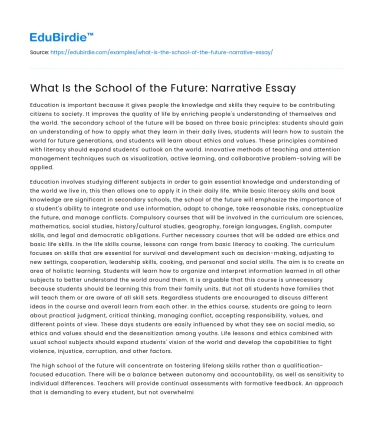Education is important because it gives people the knowledge and skills they require to be contributing citizens to society. It improves the quality of life by enriching people's understanding of themselves and the world. The secondary school of the future will be based on three basic principles: students should gain an understanding of how to apply what they learn in their daily lives, students will learn how to sustain the world for future generations, and students will learn about ethics and values. These principles combined with literacy should expand students' outlook on the world. Innovative methods of teaching and attention management techniques such as visualization, active learning, and collaborative problem-solving will be applied.
Education involves studying different subjects in order to gain essential knowledge and understanding of the world we live in, this then allows one to apply it in their daily life. While basic literacy skills and book knowledge are significant in secondary schools, the school of the future will emphasize the importance of a student's ability to integrate and use information, adapt to change, take reasonable risks, conceptualize the future, and manage conflicts. Compulsory courses that will be involved in the curriculum are sciences, mathematics, social studies, history/cultural studies, geography, foreign languages, English, computer skills, and legal and democratic obligations. Further necessary courses that will be added are ethics and basic life skills. In the life skills course, lessons can range from basic literacy to cooking. The curriculum focuses on skills that are essential for survival and development such as decision-making, adjusting to new settings, cooperation, leadership skills, cooking, and personal and social skills. The aim is to create an area of holistic learning. Students will learn how to organize and interpret information learned in all other subjects to better understand the world around them. It is arguable that this course is unnecessary because students should be learning this from their family units. But not all students have families that will teach them or are aware of all skill sets. Regardless students are encouraged to discuss different ideas in the course and overall learn from each other. In the ethics course, students are going to learn about practical judgment, critical thinking, managing conflict, accepting responsibility, values, and different points of view. These days students are easily influenced by what they see on social media, so ethics and values should end the desensitization among youths. Life lessons and ethics combined with usual school subjects should expand students' vision of the world and develop the capabilities to fight violence, injustice, corruption, and other factors.
Save your time!
We can take care of your essay
- Proper editing and formatting
- Free revision, title page, and bibliography
- Flexible prices and money-back guarantee
The high school of the future will concentrate on fostering lifelong skills rather than a qualification-focused education. There will be a balance between autonomy and accountability, as well as sensitivity to individual differences. Teachers will provide continual assessments with formative feedback. An approach that is demanding to every student, but not overwhelming will be placed. Learning that is collaborative and social is encouraged as a top teaching method. Collaborative learning environments help students to think for themselves, listen to others, and explain their thinking processes. Overall this allows students to learn more, enjoy learning, and welcome new challenges. Another important learning method that will be used is visualization. Organized knowledge that can be visualized and then connected to concepts can lead to the ability to transfer knowledge to a deeper longer-term understanding of what is being taught in the classroom, this is what the school of the future strives for.
Inequality in education remains a critical and unresolved issue that persists because of insufficient political action and lack of awareness from both individuals and society. The segregation of students by their economic status worsens individuals' challenges and limits their progress. According to Statistics Canada, lower-income neighborhoods continuously obtain lower achievement levels. Secondary schools create separate academic pathways, so low-income students are more likely to end up in applied classes, resulting in the student being unprepared and ineligible for many post-secondary opportunities. The school of the future will address the issue of inequality by directly supporting less-resourced families and providing access to educational and economic resources. Traditional policies often increase funding for specific programs, schools, or sectors. In classrooms, teachers are encouraged to create tasks with different levels of challenge. This is so they do not predetermine what students can achieve. Overall, more comprehensive policies are needed to alter the cycle of inequality. As for the issue of high school dropouts, Statistics Canada has mentioned the rates have improved. The school will focus on inclusive and comprehensive programs that will reach students that need to be reached. The curriculum should be relevant to each individual, and critical conversations are encouraged among students. Students who exhibit early signs of dropping out will be identified and supported.
Education is one of the most powerful instruments for reducing poverty and inequality and it sets the foundation for sustained economic growth. Knowledge, skill, technique, and information are tools within education that enable people to know their rights and duties towards their family, society, and nation. Fortunately, there is a lot more potential within education to help the world flourish.






 Stuck on your essay?
Stuck on your essay?

